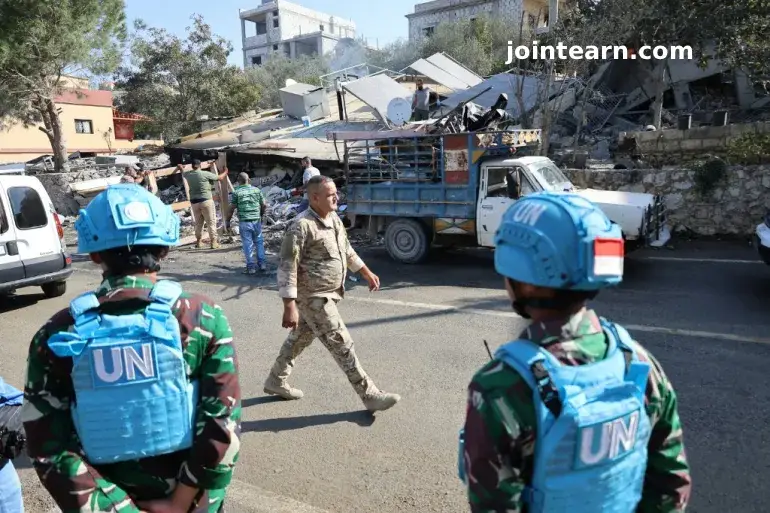
Israel has escalated its military operations in southern Lebanon, resulting in the deaths of three civilians, despite a one-year-old ceasefire agreement. The European Union has urgently called on Israel to respect the truce, warning that continued violations could destabilize the region further.
UN peacekeepers from the United Nations Interim Force in Lebanon (UNIFIL) were observed monitoring cleanup operations after an Israeli air raid struck the southern village of Et Taybeh overnight. The attacks underscore the fragile security situation in Lebanon, where nearly daily Israeli air and drone strikes have intensified tensions along the border.
Latest Attacks in Southern Lebanon
According to Lebanon’s National News Agency (NNA), two brothers were killed when an Israeli airstrike targeted their vehicle between Ain Ata and Shebaa, southeastern towns near the border.
Later on Saturday, an Israeli drone struck a car near Salah Ghandour Hospital in Bint Jbeil, injuring seven civilians. Reports indicate that two missiles hit the vehicle in a densely populated area, highlighting the risks to civilian populations in southern Lebanon.
The third strike of the day hit a car in the Baraachit area. Images shared by NNA showed smoke rising over the wreckage, with one confirmed fatality and four injured individuals, according to Lebanon’s Ministry of Health Affairs.
Israel’s military claimed these attacks targeted Hezbollah positions but provided no concrete evidence to support the claims.
Hezbollah and the Ceasefire
Despite the truce brokered in November 2024, Israel has continued near-daily attacks while maintaining forces in southern Lebanon. Hezbollah maintains that it remains committed to the ceasefire but insists that it will not disarm as long as Israel occupies Lebanese territory and continues military operations.
The ceasefire terms tasked the Lebanese army with disarming Hezbollah in southern Lebanon by the end of the year, after which nationwide operations were planned. Hezbollah has accused Israel of using this process to consolidate control over Lebanese territory.
European Union Condemns Israeli Strikes
The European Union issued a strong statement condemning recent Israeli strikes. EU foreign affairs spokesman Anouar El Anouni said:
“The EU calls on Israel to cease all actions that violate UN Security Council Resolution 1701 and the ceasefire agreement reached a year ago. We urge Hezbollah and other Lebanese groups to refrain from any measures that could further inflame tensions.”
Lebanese President Joseph Aoun also criticized Israel’s operations, calling them a “flagrant breach of international law.” Iran described the strikes as “savage” and called for global intervention.
The Lebanese army accused Israel of attempting to “undermine Lebanon’s stability” and obstruct the full deployment of Lebanese forces, which are mandated under the ceasefire to maintain security in southern Lebanon.
Threats to Civilians and Regional Stability
The United Nations peacekeeping force, UNIFIL, warned that Israel’s attacks endanger civilians and hinder Lebanese military efforts to control unauthorized weapons and infrastructure in the south, a likely reference to Hezbollah operations.
Earlier this week, Israeli attacks killed at least one person and injured nine others across southern Lebanon. Israeli Prime Minister Benjamin Netanyahu, wanted by the International Criminal Court for alleged war crimes in Gaza, signaled that Israel could escalate military operations in Lebanon.
Defence Minister Israel Katz reinforced the warning, stating:
“Maximum enforcement will continue and even intensify – we will not allow any threat to the residents of northern Israel.”
Tensions Remain High
Since the ceasefire, Israel has maintained troops in five southern Lebanese areas and conducted regular strikes, claiming they target Hezbollah positions. The situation remains highly volatile nearly a year after Israel assassinated Hezbollah’s longtime leader, Hassan Nasrallah, in September 2024, significantly weakening the group’s senior leadership.
Lebanon’s government, under pressure from the United States, has ordered the army to draft a plan to disarm Hezbollah—a move the group deems “hasty” and dangerous. President Aoun has instructed the armed forces to respond to any further Israeli incursions after Israeli troops killed a municipal worker during an overnight operation along the border.
Conclusion
The repeated Israeli attacks on Lebanon, civilian casualties, and ongoing tensions with Hezbollah highlight the fragility of the November 2024 ceasefire. Regional observers warn that without strict adherence to international agreements, the situation could spiral into a larger conflict, further destabilizing Lebanon and the broader Middle East.


Leave a Reply